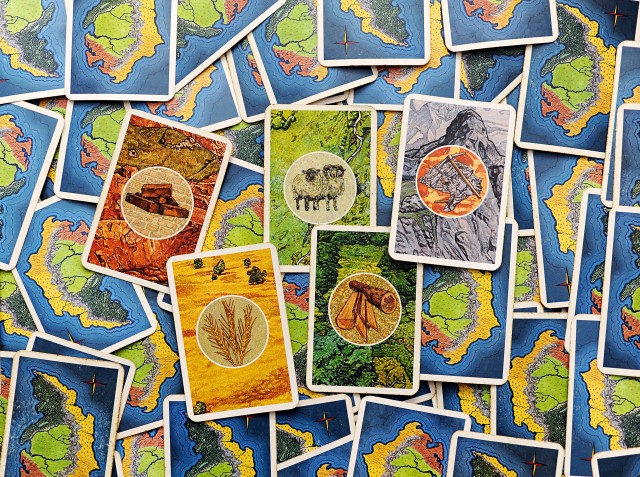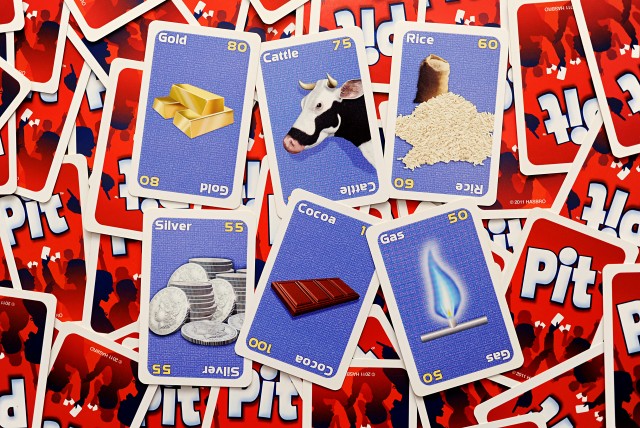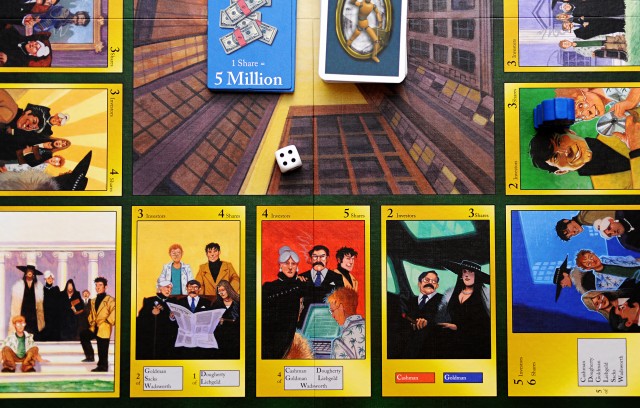One of the things that board games do better than any other form of entertainment is let you negotiate with your opponents. Even games that don’t have trading or other deal-making written into the rules, often lend themselves to wheeling and dealing. Every gamer instinctively knows the phrase “I won’t attack you this turn of you don’t attack me on your turn.” When I was a kid, our trades in Monopoly often included a limited “metropass” which would allow the recipient to not pay rent on a property for a negotiable number of landings. I feel confident that many of you out there had similar arrangements, if not terminology.
Why does trading find its way into so many games, either by design or development? Because everyone wants to get something for nothing. Trading and deal brokering allows players to feel like they are getting the better of their competitors. And negotiation is a real-world skill that can have applications both in and out of the game, making a valuable ability that games can teach us.
There are numerous excellent games whose core concepts and mechanics revolve around bartering, trading, negotiating or wheeling and dealing in some way. Some are themed on real trading institutions, such as the classic commodities trading game Pit, or Sid Sackson’s masterpiece of back room deals, I’m the Boss. Others take the idea of deal-making and apply them to other themes, such as Settlers of Catan‘s pioneering theme, or Diplomacy‘s treaty making and global domination.
Settlers of Catan is a classic negotiation game – few players are able to position themselves so perfectly on the board that they  become self-sufficient (at least in the early stages), so trading is crucial to success. The game certainly has other elements to it: area control, resource management, and probability assessment; but negotiation is the factor that made the game the hit that it is. Once upon a time, Settlers was THE gateway game to introduce people to the world of Eurogames. Twenty years later, it may not be everyone’s first Eurogame, but it is still going strong. Now known just as Catan, it was the first Eurogame to make it out of the hobby stores and onto the shelves of major North American retailers like Target, Chapters/Indigo, Barnes & Noble, Toys R Us and more.
become self-sufficient (at least in the early stages), so trading is crucial to success. The game certainly has other elements to it: area control, resource management, and probability assessment; but negotiation is the factor that made the game the hit that it is. Once upon a time, Settlers was THE gateway game to introduce people to the world of Eurogames. Twenty years later, it may not be everyone’s first Eurogame, but it is still going strong. Now known just as Catan, it was the first Eurogame to make it out of the hobby stores and onto the shelves of major North American retailers like Target, Chapters/Indigo, Barnes & Noble, Toys R Us and more.
Pit is a boisterous trading game for three to eight players that mimics the stock exchange trading floor. All the game has is cards (and a little bell, if you have the deluxe edition). All you need to play is the ability to count to eight, and the desire to yell at your friends and corner the market. The deck consists of commodity cards (wheat, oats, cattle, gold, natural gas, etc. it differs from edition to edition). The deck is divided evenly between all the players and as  soon as someone yells “go!” the trading begins. The goal is to collect all eight cards of one commodity before anyone else corners the market in a different commodity. Trading is done blind – players don’t know what they are going to receive in a trade, just the number of cards. Players declare how many cards they are looking to trade (they must all be the same commodity) and keep yelling the number until they find a trading partner who has the same number of cards to trade. If no one is trading your amount, change the size of your trades. If no one else is trading what you’re trying to collect, change what you’re collecting, but know that you may now be trading away the commodity that someone else needs to win. Keep trading until someone corners the market in one good. Each commodity is worth a different amount of points, so when you corner the market, you score the value of your monopoly. Play three rounds and the trader with the highest over all score wins. Pit has been around since the beginning of the previous century, and unlike some other games of its age, it is still as fun to play as the day it was first released.
soon as someone yells “go!” the trading begins. The goal is to collect all eight cards of one commodity before anyone else corners the market in a different commodity. Trading is done blind – players don’t know what they are going to receive in a trade, just the number of cards. Players declare how many cards they are looking to trade (they must all be the same commodity) and keep yelling the number until they find a trading partner who has the same number of cards to trade. If no one is trading your amount, change the size of your trades. If no one else is trading what you’re trying to collect, change what you’re collecting, but know that you may now be trading away the commodity that someone else needs to win. Keep trading until someone corners the market in one good. Each commodity is worth a different amount of points, so when you corner the market, you score the value of your monopoly. Play three rounds and the trader with the highest over all score wins. Pit has been around since the beginning of the previous century, and unlike some other games of its age, it is still as fun to play as the day it was first released.
After being out of print for quite some time, I’m the Boss has finally come back on the market to much rejoicing by gamers everywhere. I bought a copy for my personal collection the moment it became available! Three to six players are power brokers in the business world, making deals to earn money for their rich clients. After a certain number of deals get inked, the player with the most cash in the bank is the winner. The active player is The Boss and gets to set  the terms of the current deal (within the general parameters of the deal provided by the game). If the other players named in the deal agree to the terms, the deal is done and people get paid, but sometimes one of the parties will want a bigger cut than the Boss offered, or someone who didn’t get asked to partake wants a cut. Add to that influence cards that let players try to alter the deal to suit their wants, and you have a free-form, cutthroat, wheeling and dealing masterpiece on your hands.
the terms of the current deal (within the general parameters of the deal provided by the game). If the other players named in the deal agree to the terms, the deal is done and people get paid, but sometimes one of the parties will want a bigger cut than the Boss offered, or someone who didn’t get asked to partake wants a cut. Add to that influence cards that let players try to alter the deal to suit their wants, and you have a free-form, cutthroat, wheeling and dealing masterpiece on your hands.
Uwe Rosenberg’s Bohnanza is hands down the best card game about bean farming and trading the world will ever see. Three to seven players are bean farmers trying to get rich by growing and selling valuable legumes. I know, I should probably stop writing, because you’ve all stopped reading in your rush to go and buy Bohnanza, right? But in all seriousness, this game is great. Thanks to a fantastic set of trading and growing limitations, no game on the market will make you happier to get Stink for Chili!
Diplomacy is around 60 years old, and it is still the undisputed king of “friendship-killer” games. Set at the time of the Great War, Diplomacy pits three to seven (and it’s best at seven) players as world leaders, trying to conquer all of Europe. Unlike other war games of the era, Diplomacy cuts out the randomness of warfare by getting rid of dice or card-driven combat mechanics. Instead, all aggression is resolved through the negotiation of treaties. If enough other players support your bid to annex Poland, then Poland is yours. It is reported to be Henry Kissinger’s favourite game.
A recent game that uses negotiation, in the form of bribery, is Sheriff of Nottingham. Players are outlaws trying to get to the market, without having the titular Sheriff catch them with contraband in their possession. Players must tell the Sheriff what they have in their bags, but they don’t have to tell the truth, and they can bribe the Sheriff not to examine the bags too closely, or they can bribe the Sheriff to ensure that he takes a very good look at the contents of another player’s bag.
While far from an exhaustive list, it should be enough to get anyone new to the idea of negotiation games up and running, and making deals.
Comments
No comments yet! Be the first!